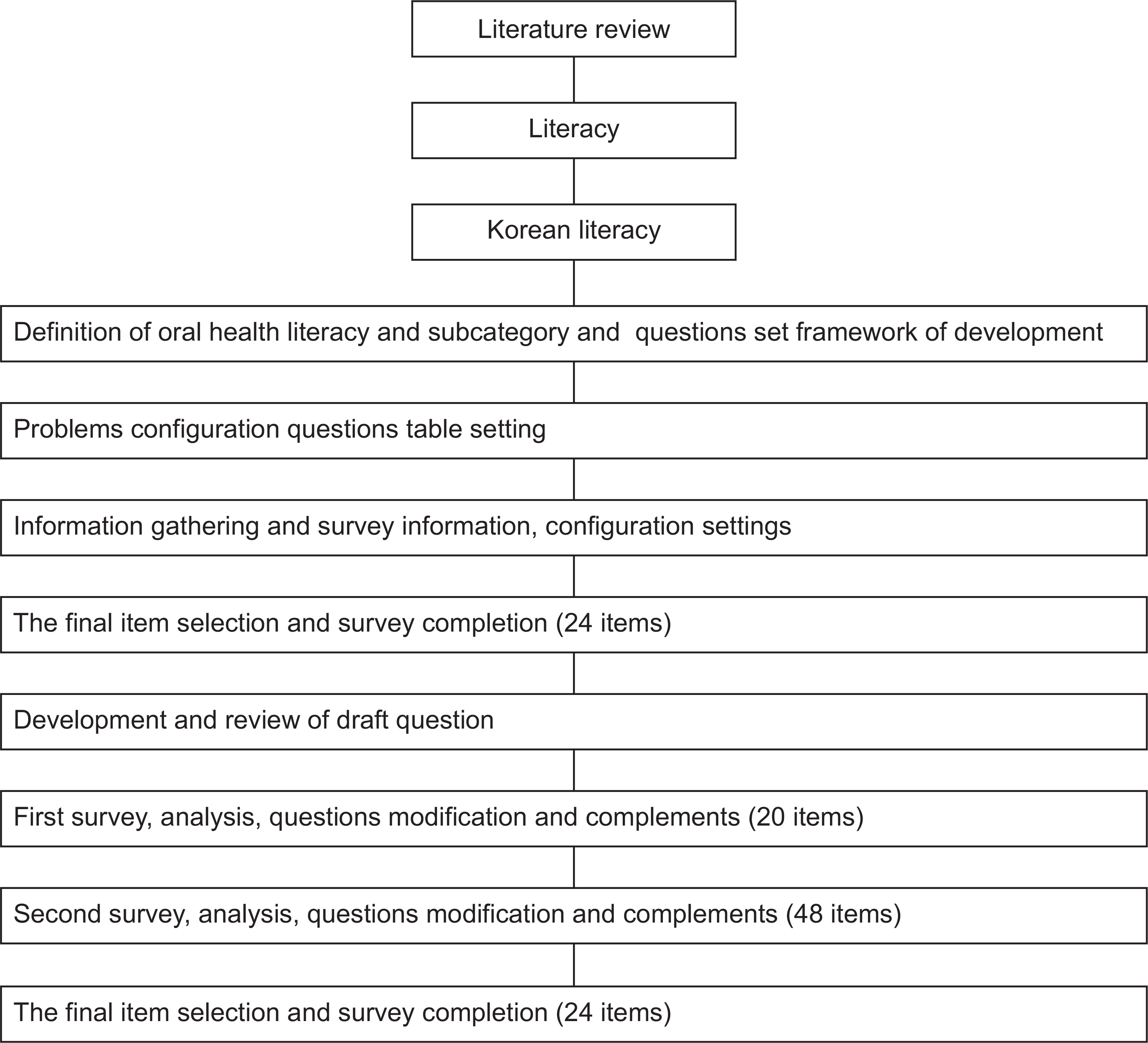J Korean Acad Oral Health.
2015 Dec;39(4):237-244. 10.11149/jkaoh.2015.39.4.237.
Pilot study on development of oral health literacy evaluation tool for Korean adults
- Affiliations
-
- 1Department of Preventive & Community Dentistry, Institute of Oral-bio Science, Chonbuk National University Dental School, Jeonju, Korea. prevdent@jbnu.ac.kr
- KMID: 2151777
- DOI: http://doi.org/10.11149/jkaoh.2015.39.4.237
Abstract
OBJECTIVES
Oral health literacy is defined as 'the degree to which individuals have the capacity to obtain, process, and understand basic oral health information and services needed to make an appropriate health decision'. This goal of this study was to develop an instrument for assessing oral health literacy in Korean adults.
METHODS
This instrument was developed by using the adult literacy evaluation tool of the Korean Government. The components were mainly related to 2 conditions ('oral health information' and 'dental treatment instruction'), and they were classified into 3 cognitive processes (realistic, deductive, and critical domains). Furthermore, all of the subcomponents were divided into prose and non-prose. Therefore, each of the 12 subcomponents had 4 items, resulting in a final questionnaire with 48 items. A pilot survey was conducted in 51 adults, and the quality of the questionnaire was subsequently evaluated. We identified reliability by using Cronbach's alpha, discrimination, and difficulty. Two items from each of the 12 subcomponents were selected as the final items. We set the difference thresholds at over 0.5 and over 0.3 for reliability and discrimination, respectively. Finally, we distributed the difficulty from 35 to 95%.
RESULTS
The reliabilities of all items (48) and the final items (24) were 0.838 and 0.836, respectively. The mean discrimination of the final items was higher than that of all items (mean: 0.5 and 0.3, respectively). The difficulty curve of the final items followed a normal distribution.
CONCLUSIONS
The reliability and validity demonstrated by the final 24 items indicates that they are appropriate for evaluating oral health literacy in adults.
MeSH Terms
Figure
Cited by 2 articles
-
Oral health literacy of Korean adults
Hae-Jin Lee, Kee-Wan Chang
J Korean Acad Oral Health. 2017;41(2):102-109. doi: 10.11149/jkaoh.2017.41.2.102.Development of oral health literacy assessment tool for fifth and sixth grade elementary school students
Jinsil Hong, Yuna Shin, Kee-Wan Chang
J Korean Acad Oral Health. 2017;41(3):214-221. doi: 10.11149/jkaoh.2017.41.3.214.
Reference
-
References
1. National Network of libraries of medicine. Provide outreach [Internet]. [cited 2014 Aug 01]. Available from:. http://nnlm.gov/outreach/consumer/hlthlit.html.2. Bridges SM, Parthasarathy DS, Au TK, Wong HM, Yiu CK, McGrath CP. Development of functional oral health literacy assessment instruments: application of literacy and cognitive theories. J Public Health Dent. 2013; 74:110–119.
Article3. Richman JA, Lee JY, Rozier RG, Gong DA, Pahel BT, Vann WF. Evaluation of a word recognition instrument to test health literacy in dentistry: the REALD-99. J Public Health Dent. 2007; 67:99–104.
Article4. Lee JY, Rozier RG, Lee SYD, Bender D, Ruiz RE. Development of a word recognition instrument to test health literacy in dentistry: The REALD 30 -a brief communication. J Public Health Dent. 2007; 67:94–98.5. Gong DA, Lee JY, Rozier RG, Pahel BT, Richman JA, Vann WF. Development and testing of the test of functional health literacy in dentistry (TOFHLiD). J Public Health Dent. 2007; 67:105–112.
Article6. Gironda M, Der-Martirosian C, Messadi D, Holtzman J, Atchison K. A brief 20 item dental/medical health literacy screen (REALMD20). J Public Health Dent. 2013; 73:50–55.7. Sabbahi DA, Lawrence HP, Limeback H, Rootman I. Development and evaluation of an oral health literacy instrument for adults. Community Dent Oral Epidemiol. 2009; 37:451–462.
Article8. Bridges SM, Parthasarathy DS, Au TK, Wong HM, Yiu CK, McGrath CP. Development of functional oral health literacy assessment instruments: application of literacy and cognitive theories. J Public Health Dent. 2014; 74:110–119.
Article9. Ju HJ, Oh HW, Kim JY, Lee HS. A cross-sectional study on oral health literacy and its influencing factors among adults: I. verbal oral health literacy. J Korean Acad Oral Health. 2012; 36:87–95.10. Kim SS, Kim SH, Lee SY. Health literacy: development of a Korean health literacy assessment tool. Korean Soci for Health Educ and Promot. 2005; 22:215–227.11. Ju HJ, Oh HW, Lee HS. A cross-sectional study on oral health literacy and its influencing factors among adults; II. functional oral health literacy. J Korean Acad Oral Health. 2013; 37:81–88.
Article12. Parker RM, Baker DW, Willians MV, Nurss JR. The test of functional health literacy in adults: a new instrument for measuring patients’ literacy skills. J Gen Intern Med. 1995; 10:537–541.13. Kim CW, Seo H, Yoon JC, Lee KK, Jung GJ, Lim SI. The foundation of the National Literacy Survey. Seoul: The National Institute of the Korean Language;2008. p. 7,19–20,65.14. Horowitz AM, Kleinman DV. Oral health literacy: the new imperative to better oral health. Dent Clin North Am. 2008; 52:333–344.
Article15. Nutbeam D. Health literacy as a public health goal: a challenge for contemporary health education and communication strategies into the 21st century. Health Promot Int. 2000; 15:259–267.
Article16. Lee JS. Modern educational evaluation. Gyeong Gi: Kyoyookbook;2009. 160:168. p. 193–199.17. Sung TJ. Easy statistical analysis. 2nd ed. Seoul: Hakjisa;2015. p. 417.18. Sung TJ, Kim KH. An investigation of changes of the reliability coefficients and the test information functions by varying the number of items, item discrimination, and item difficulty. J of Educ Evaluat. 1993; 6:123–154.19. Park DS. Question make methodology. Seoul: Kyoyookbook;2005. p. 30.20. Lynn MR. Determination and quantification of content validity. Nursing research. 1986; 35:382–386.
Article21. Sung TJ. Theory and practice of question make and analysis. Seoul: Hakjisa;2008. p. 63.
- Full Text Links
- Actions
-
Cited
- CITED
-
- Close
- Share
- Similar articles
-
- A cross-sectional study on oral health literacy and its influencing factors among adults: II. Functional oral health literacy
- Relationship of oral health literacy with oral health behaviors among adults
- Development of oral health literacy assessment tool for fifth and sixth grade elementary school students
- A cross-sectional study on oral health literacy and its influencing factors among adults: I. Verbal oral health literacy
- Oral health literacy and related socioeconomic factors in mothers


